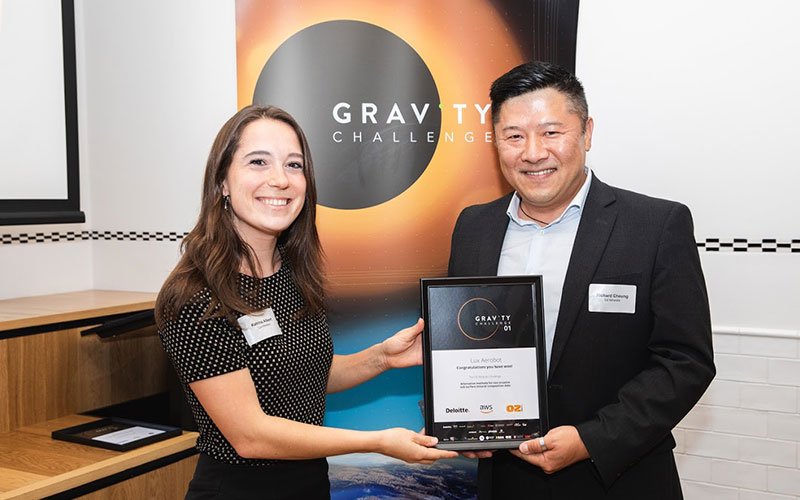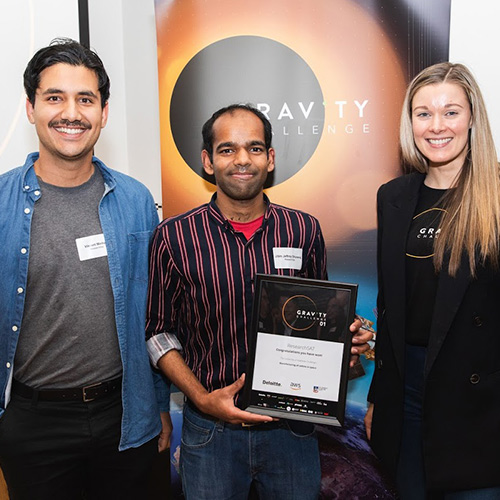
Founder of Lux Aerobot, Katrina Albert accepting her GRAVITY Challenge award.
Two startups at UniSA’s Innovation & Collaboration Centre (ICC) have taken out three of 10 challenges at the GRAVITY Space Challenge that wrapped up last week.
The six-week challenge sponsored by Deloitte is a national technology innovation program for corporates, entrepreneurs and universities to design and build solutions to real industry, social and environmental problems.
Canada’s Lux Aerobot won the OZ Minerals Challenge to find new techniques to perform mineral exploration and analysis without the need to drill so many holes so deeply or drill at all.
Their proposed solution used Lux’s data analytics platform to suggest actionable insights for drilling locations. To do this, Lux would deploy a fleet of stratospheric balloons to deliver near real-time data and imagery to be analysed for future exploration. This would provide cheap and precise data and intelligent software to deliver actionable insights to exploration teams.
Lux also won the Airservices Australia Challenge to better understand he impact weather patterns have on high demand air space.
The startup relocated to Adelaide in August to participate in the country’s first incubator program for space startups, Venture Catalyst Space.
Alumni of the Venture Catalyst Space program, ResearchSat took out the University of Adelaide’s Manufacturing Tablets Challenge addressing space medicine and human space exploration.
Astronauts become sicker during space missions than other remote locations and often have limited access to medical treatment. It is reported the medicines on hand decompose when exposed to cosmic rays, so how then can this be avoided, and can medicines be made in space with local ingredients?
ResearchSat proposed an innovative approach involving multiple parties. With manufacturing in orbit being a near future capability and the main barriers being cost and complex processes, they made several suggestions to keep costs down including reusable rockets, advanced materials and manufacturing techniques and automated experiments aboard nanosatellites.
Aerospace Engineer and CTO of ResearchSat, Jibin Dhanaraj says the space program and support as an ICC resident have helped make connections with researchers and industry.
“We are currently working with researchers from both the University of Adelaide and the University of South Australia and have taken their valuable inputs, fine tuning our nanosatellite platform to serve their micro-gravity research interest. The ICC has greatly helped us in various aspects of our journey for the past one year and continues to do so,” he says.
Associate Director of the ICC, Jasmine Vreugdenburg says the competition was a great opportunity for startups.
“It’s great to see our space startups achieving success in this challenge and getting their technologies in front of potential customers,” she says.
“We are proud of the achievements of all the companies in the Venture Catalyst Space program and hope this challenge further cements Lux and ResearchSat as emerging companies to watch.”
About the Venture Catalyst Space program
Venture Catalyst Space is the country’s first space incubator program to develop and grow innovative or disruptive ideas from entrepreneurs and startups in the space sector. The program gives founders the support and tools they need to plan and successfully execute the building of a scalable and investment ready business with mentoring, workshops, office space and a stipend. Expressions of interest for the 2020 program are to be emailed to venturecatalyst@unisa.edu.au.
Media contact: Georgia Minarelli email Georgia.Minarelli@unisa.edu.au mobile: 0413 314 726
icc.unisa.edu.au




